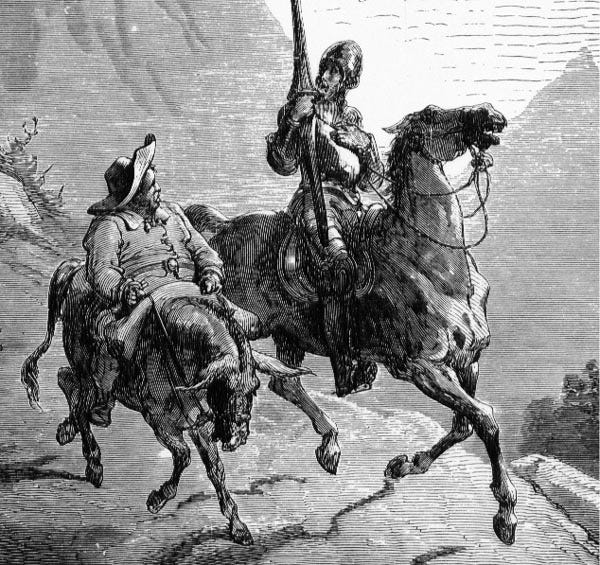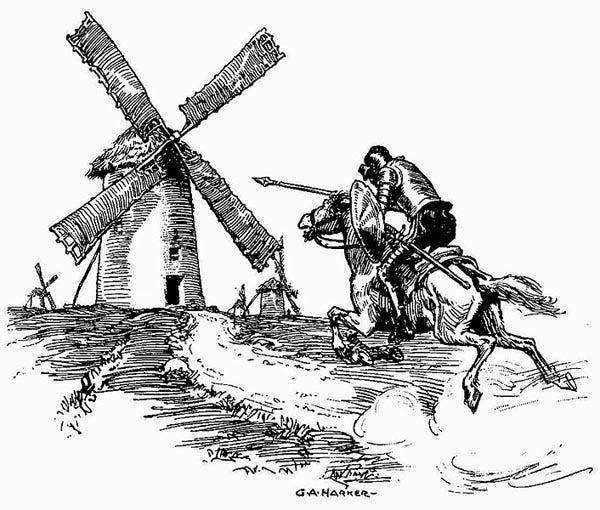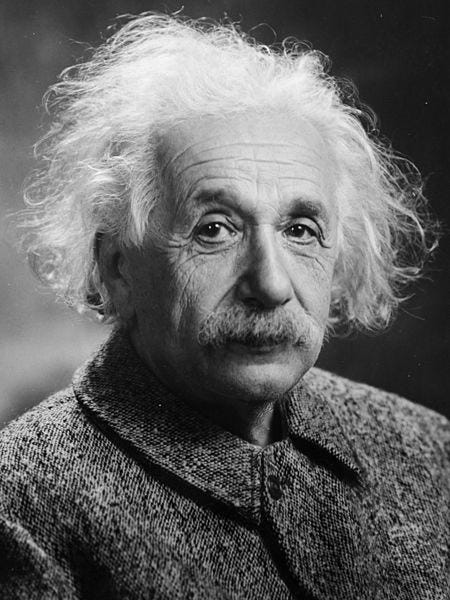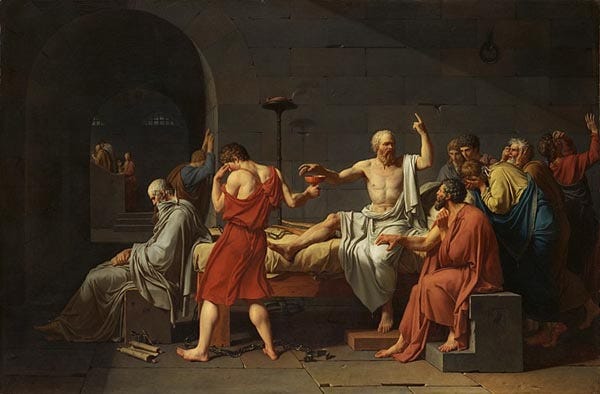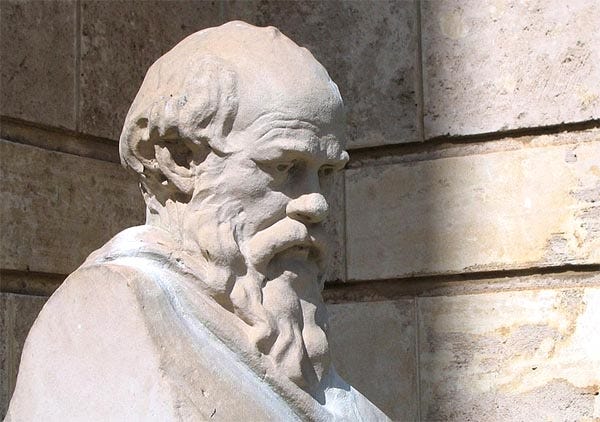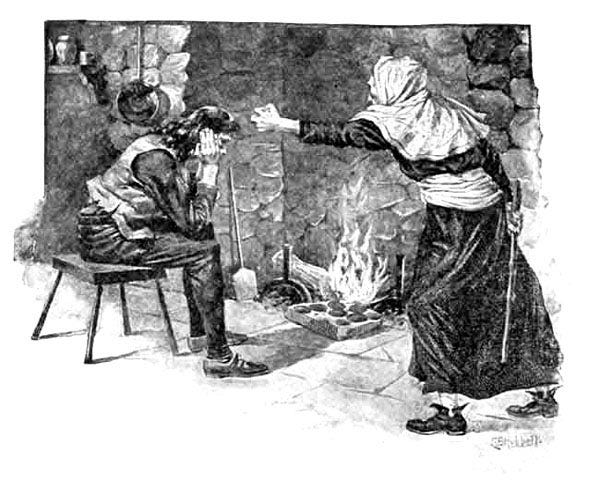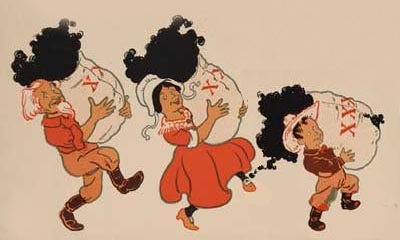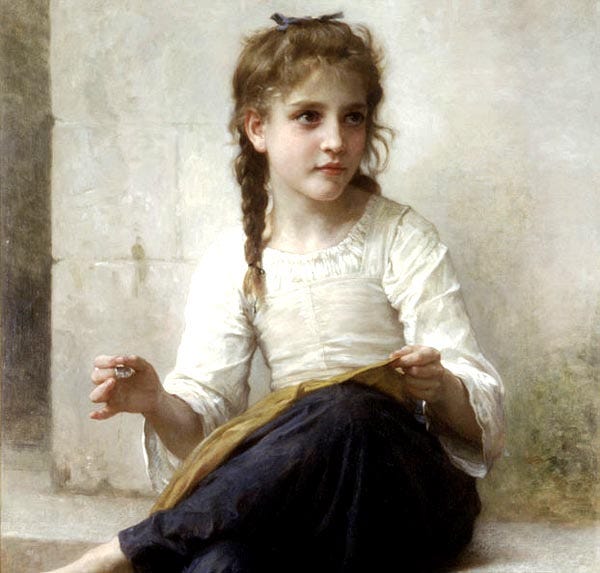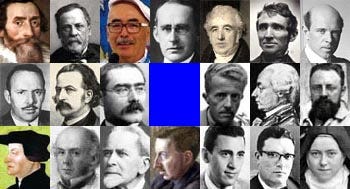Vol. I, Is. 9: Don Quixote... and More!
Plus Einstein, Socrates, "King Alfred and the Cakes," "Baa, Baa, Black Sheep"
Welcome to Volume I, Issue 9, of The Jim Bucket List, an encyclopedic look at the things that "everybody ought to know"!
Contents:
LITERATURE: Don Quixote de la Mancha
TIDBITS: Common Mistakes
SCIENCE: Albert Einstein, THE Scientist of the 20th Century
TIDBITS: Fun with Words: Janus Words
PHILOSOPHY: The Death of Socrates
TIDBITS: Truly Trivial
FOR YOUNG READERS: "King Alfred and the Cakes"
READ-ALOUD-RHYME: "Baa, Baa, Black Sheep"
A WORD TO THE WISE: "A stitch in time saves nine"
VOCABULARY BUILDER: export
THIS WEEK'S BIRTHDAYS: Dec. 27-Jan. 2
Let's go!
LITERATURE: Don Quixote de la Mancha
Listen to the audio of this article:
Don Quixote de la Mancha
Miguel de Cervantes's comic novel The Ingenious Gentleman Don Quixote of La Mancha (1605-1615) has earned its place in the canon of world literature. Cervantes was a man of broad experience, almost as fascinating as the "knight errant" himself: wounded in battle, captured by pirates, five years a slave in North Africa, he may have started writing his classic while imprisoned for mishandling the King of Spain's money.
Nevertheless, his influence is so great that some people have called Spanish "the language of Cervantes." He is to Spanish as Shakespeare is to English. (Remarkable, then, that both men died on the same day.) And, like Shakespeare, he has given us new words: "quixotic" has come to mean impulsive and unpredictable, but also chivalrous, romantic, and visionary.
It all starts with Alonso Quixano, a (fictional) minor nobleman living in the 15th century--long after the days of chivalric culture--who reads so many novels about that romantic age that he loses his mind and fancies himself to be Don Quixote de la Mancha, a "knight-errant" who will wander the countryside with his trusty squire (actually a simple farmer), Sancho Panza--righting wrongs, freeing captive maidens, and slaying dragons. As is the custom with such "knights errant," he receives a nickname--but his, of course, is comical: "The Knight of the Sad Face" (sometimes rendered "the Woeful Countenance").
The whimsical Part I of the book's two parts is by far the more popular, and was published in 1605, ten years before the second, more serious and philosophical part.
In Part I, the nearly-50-year-old Quixano lives with his niece and his housekeeper, and believes every word of the romances he reads. He dons an old suit of armor and dubs his tired old horse "Rocinante," meaning, actually, a low-quality workhorse. He chooses a local farm girl, Aldonza Lorenzo, as his inspiration, his "lady love," and renames her "Dulcinea del Toboso." She is unaware of this social promotion.
After setting out alone--Sancho has not joined him yet--"Don Quixote" comes to an inn, which in his madness he takes for a castle. He insists that the innkeeper (the "Lord of the Castle") formally knight him. After he keeps his vigil, the innkeeper humors him by performing a mock ceremony and sends him on his way.
Next, he comes across a slave named Andres who is tied to a tree and being beaten by his master. Don Quixote makes the master swear to treat the slave fairly, but after he rides away, the master reneges and the beatings are doubled.
When some traveling merchants he encounters on the road insult his "Dulcinea," he attacks them. They beat him severely and the altercation ends with him lying by the side of the road. A neighboring peasant finds him and returns him to his home.
There, as he lies ill, his niece, the housekeeper, the local priest, and a barber (who in those days functioned as a kind of doctor) burn his library to prevent him from getting even more crazy ideas, telling Quixano/Quixote that the books were destroyed by an evil wizard. Cervantes uses this section to comment on many popular books of the day, including his own.
Feigning good health, the old knight sets out again, this time having recruited his trusty "squire" Sancho Panza. Sancho's earthy common sense provides balance to Don Quixote's head-in-the-clouds approach. It is on this, the second sally, that the famous story of the mad knight attacking some windmills, believing them to be giants, takes place. Even today, in English, "tilting at windmills" is used to mean "attacking imaginary enemies."
The two companions encounter a party that includes two Benedictine friars and a lady in a carriage--companions of the road, but not actually members of one party. Quixote takes the two for enchanters holding the lady hostage, and attacks, knocking one of the friars from his horse. An armed Basque takes up the fight, turning away the old man's ineffectual blows by using a pillow from the carriage as a shield (as he has none). In the end, the gracious lady commands those traveling with her to "surrender" to Don Quixote.
After further adventures with goat herders, a shepherdess, musketeers, muleteers, a dead body, a group of galley slaves, a spurned lover, a spurious princess, pilgrims, and others, Part I ends with a promise of more.
Part II takes a more serious turn. In the end, after recovering from a serious illness, Quixano awakes as from a dream with his sanity fully restored. The practical Sancho actually tries to convince him to maintain his illusions, but Quixano apologizes to all for the harm his fantasies have caused others. Before he dies, he dictates his will, which specifies that his niece will be disinherited if she marries a man who reads the books of chivalry which brought him so much mental distress.
--------
PRACTICE:
Vocabulary: Match the words to their meaning. Answers below.
1. altercation
2. chivalric
3. errant
4. feigning
5. humors
6. rendered
7. romances
8. tilting
9. vigil
10. whimsical
A. translated; interpreted
B. lighthearted; humorous
C. pertaining to the medieval practice of knighthood
D. wandering; roving
E. angry disagreement, sometimes leading to violence
F. long period of watching, usually at night
G. charging on horseback at something holding a long spear
H. cooperates with someone to ease a disagreement
I. pretending; faking
J. early novels
QUESTIONS TO ANSWER
Answer the following questions in your own words. Suggested answers below.
How can we describe the importance of the author Miguel de Cervantes in Spanish culture?
Describe Alonso Quixano.
What does "quixotic" mean?
Who was Sancho Panza?
What is the most famous adventure of Don Quixote?
QUESTIONS TO THINK ABOUT:
These questions do not have "right" or "wrong" answers. They only ask your opinion.
Why do you think Don Quixote was nicknamed "The Knight of the Sad Face" (or "the Woeful Countenance")?
Don Quixote chose a squire, a "steed" or "charger," and a "lady love," like every good knight should have. But his was really a farmer, a broken-down old horse, and a simple farm girl. Why did Cervantes make these things so silly-looking?
Quixano's niece, the housekeeper, the local priest, and the barber burned his books? Can you think of other ways to solve the problem of his behavior?
TIDBITS: Common Mistakes
WRONG: I could care less.
RIGHT: I couldn't care less.
MEANING: This is really unimportant to me.
TIP: If you could care less, there's still room to reduce your concern. If you couldn't care less, you've reach rock bottom in the caring department.
--------
WRONG: Act now! Seats are "first come, first serve!"
RIGHT: Act now! Seats are "first come, first served!"
MEANING: The first people to arrive will be the first to be served.
TIP: "First serve" sound like the first people must serve others!
--------
WRONG (sort of): Come towards me.
RIGHT: Come toward me.
MEANING: Move in my direction.
TIP: In American English, toward--without the s--is preferred in formal writing. In British English, it's the opposite. The same is true for forward, backward, upward, downward, and afterward. However, you'll hear both forms used in both types of English; it's more a preference than a hard-and-fast rule.
SCIENCE: Albert Einstein, THE Scientist of the 20th Century
Listen to the audio of this article:
Albert Einstein
Perhaps no scientist in history has achieved the public recognition of the German Albert Einstein (1879-1955). His name and face (not to mention his hairstyle) seem to be known around the world.
As familiar as his face is, though, few of us really understand his insights. That is, although "the world's most famous equation"--E=mc2--is almost as well-known as his appearance, being able to recite it without grasping it is about as far as most of us can go.
The formula is part of Einstein's famous "theory of relativity." It demonstrates the equivalence of energy (E) to mass (m) in any quantity of matter, saying that the amount of energy (in Joules) in matter is equal to the amount of matter (in kilograms) times the speed of light (c) squared (expressed in meters per second). (A Joule is a measure of energy, basically the amount needed to move something one meter.)
Again:
E: Energy
=: is equivalent to
m: mass
c: the speed of light
2: (written as a superscript) squared, or times itself
"Energy = mass times the speed of light squared."
Or, the amount of energy in any "thing" is equivalent to the amount of mass in that thing times the speed of light squared. (One needs to use the correct units for each value to make this work: Joules, kilograms, and meters per second.)
The theory remained controversial for many years; his 1921 Nobel Prize in Physics did not include any citation to relativity at all.
Einstein was born in what was then the Kingdom of Württemberg. His father was a businessman and engineer, who made electrical equipment in Munich. Though a non-observant Jew, Einstein attended Catholic school for three years, and then a public primary and secondary school for seven more years.
After his father's business failed, the family moved to Italy. Albert stayed on in Germany a little longer to finish at the German school, but noted later that he hated the "rote learning" there. He joined his family in Italy at the end of 1894.
At age 16, he entered a polytechnic school in Zurich, Switzerland, where his grades were good but he did poorly on examinations. There he met his future wife.
After having two children with his first wife, he divorced her in 1919. He remarried almost immediately (to a woman he had had an affair with since 1912) and in 1933, the couple immigrated to America. His second wife died there in 1936.
During World War II, Einstein contributed to the Manhattan Project, which developed the atomic bomb for America. Some of his public reputation is based on his later opposition to nuclear weapons.
Surprisingly, he was offered the presidentship of the then-new nation of Israel after the death of the first president. He regretfully turned it down.
Much has been made of Einstein's thoughts on religion and philosophy. Like Mark Twain and Abraham Lincoln, he often has things attributed to him that he never said. But he did in fact say some things on subjects outside of science, and his thoughts are well worth reading. Try The World as I See It for starters.
--------
PRACTICE:
Vocabulary: Match the words to their meaning. Answers below.
1. attributed
2. controversial
3. equation
4. equivalence
5. formula
6. immigrated
7. insights
8. non-observant
9. opposition
10. rote
A. not following the practice of a religion
B. condition of being the same
C. by memorization, without understanding
D. assigned to; credited to
E. not accepted by all; causing disagreement
F. a symbolic expression of a rule or principle
G. objection to; antagonism toward
H. moved into another country
I. ideas; discoveries
J. a mathematical sentence in which both sides are balanced
QUESTIONS TO ANSWER
Answer the following questions in your own words. Suggested answers below.
What is Einstein's formula (E=mc2) meant to tell us?
What do the three letters (E, m, and c) mean in Einstein's famous formula?
Did Einstein's Theory of Relativity make him famous?
What famous project did Einstein work on in America, and what was its purpose?
How did Einstein feel about nuclear weapons later in life?
QUESTIONS TO THINK ABOUT:
These questions do not have "right" or "wrong" answers. They only ask your opinion.
What would cause a person like Einstein to change his mind about something like nuclear weapons?
Many people thought Einstein was "wise" about religion and philosophy. Does being good at one thing mean you're automatically good at everything?
Einstein had an affair in his 30s, then divorced his wife and married his lover. How should a person be judged for something like that, no matter his accomplishments otherwise?
TIDBITS: Fun with Words: Janus Words
Question: In each of these sentences, does the bold word indicate a positive or a negative meaning?
The government commission sanctioned the corporation's actions.
The advance man prevented the circus in the towns on their tour.
The manager's oversight of his team led to interesting results.
The truth is, there's no way to know, because each of these words is a "Janus word" (also called a contranym, among other things) a word which can be its own opposite, depending on the context.
In the first sentence, sanction may mean "approve" or "punish." If the corporation's actions were acceptable, the commission would approve them--a positive result. If they were illegal, though, the commission might punish the corporation with fines or other penalties--not so good.
It's rare these days to see prevent meaning anything besides "stop" or "keep from happening." But centuries ago, its two parts--pre- meaning "before," and vent meaning "come"--meant to do something first, or even prepare something. An old-fashioned preacher might say John the Baptist prevented Jesus, meaning he came before him to prepare the way for him. So our circus advance man might be preparing for the troupe's arrival--or keeping them from coming.
Oversight is easy: it might mean the act of overseeing (managing) or to overlooking (neglecting). The former would probably lead to more positive results that the latter!
There are dozens if not hundreds of Janus words. "My car's engine is going" might mean that it's operating, or that it's failing. When you trim a Christmas tree, you add something to it; when you trim a piece of cloth, you take something away. To dust some cookies with powdered sugar means to put some "dust" on; when you dust the furniture, you remove some dust. And so on.
See if you make sentences with the following words that use them in opposite ways. I've added some suggestions.
clip (papers together/coupons)
fast (a runner/colors)
hold up (a building/a parade)
seed (a lawn/a watermelon)
weather (a storm/a stone)
Have fun!
PHILOSOPHY: The Death of Socrates
Listen to the audio of this article:
The Death of Socrates
Few individuals have affected the history of Western thought as profoundly as did the Greek philosopher Socrates, mainly through the writings of his student, Plato. The English philosopher Alfred North Whitehead once said, "The safest general characterization of the European philosophical tradition is that it consists of a series of footnotes to Plato"--and by extension, Socrates. Four of Plato's dialogues--the Euthyphro, the Apology, the Crito, and the Phaedo--give information that helps us understand what happened in the trial and death of Socrates.
And few paintings capture the impact of Socrates on his followers (and, ultimately, on us) more than the 1787 work of French painter Jacques-Louis David, The Death of Socrates.
In the painting, Socrates is sitting up on a bed, gesturing with one hand (still teaching!) as he reaches for a cup with the other. The person holding the cup is turned away and covering his face in grief.
Because the cup, you see, is filled with poison, and Socrates is drinking it as a form of execution by the state.
He had been tried and convicted on two charges: corrupting the youth of Athens, and impiety (worshipping false gods and not those of the state). The first charge resulted from his criticizing the leaders of Athens, and encouraging the youth to "question authority." Socrates denied that this was his intention. The second, which he freely admitted to in his trial, was because he deemed the gods, not like humans in nature, but more like concepts.
What had happened was this: a friend and follower of Socrates, Chaerephon, had gone to the Oracle at Delphi, and asked if Socrates was the wisest of men. The Oracle answered that no man was wiser than Socrates. When told this, Socrates doubted it, and began asking questions of prominent men in an effort to find one wiser than he was.
Alas, no one stood the test. Furthermore, the idle youth of the city began following him around and witnessing the disgrace of the leaders, which led to the charge that Socrates was "corrupting the youth."
Interestingly, in David's painting, Socrates is surrounded by grieving students (while his family waits outside in a hallway). Plato, anachronistically depicted as an old man, sits alone at the foot of his bed, while most of the others are crowded around the head. Their attitude stands in contrast to the confidence of Socrates, who had scolded them for their "womanly" signs of grief.
The man who has lived a moral life, he told them, had nothing to fear from death.
--------
PRACTICE:
Vocabulary: Match the words to their meaning. Answers below.
1. anachronistically
2. convicted
3. corrupting
4. deemed
5. depicted
6. disgrace
7. idle
8. impiety
9. oracle
10. prominent
A. found guilty
B. leading astray; make immoral
C. considered; thought (to be)
D. not working; hanging around
E. important
F. in the wrong time period; here, at the wrong age
G. shame; loss of respect
H. shown; portrayed
I. lack of respect for sacred things
J. a kind of fortune teller
QUESTIONS TO ANSWER
Answer the following questions in your own words. Suggested answers below.
What is in the cup Socrates is about to drink from? Why must he drink it?
What were Socrates's "crimes," according to the government?
What did Socrates think of the gods?
How did Socrates cause the youth of Athens to question authority?
What did Socrates think of death?
QUESTIONS TO THINK ABOUT:
These questions do not have "right" or "wrong" answers. They only ask your opinion.
Why do you think Socrates doubted that he was "the wisest of men."
Do you think a teacher should be punished for causing young people to ask questions about their societies' leaders?
Do you agree with Socrates, that a good person doesn't need to be afraid of death?
TIDBITS: Truly Trivial
Did you know?
Spit it out!: A number of science-y sites say breathlessly, "A human produces enough saliva throughout their life to fill two swimming pools!" 'Tain't so. One of the smallest in-ground pools I could find was 10' x 20' with an average depth of 5'. And that held 30,000 quarts of water (7,500 gallons). The average human produces 25,000 quarts of saliva over the course of a lifetime, so conservatively, that's 1.2 swimming pools. I even found a site (with "Amazing" in its title) that said "two Olympic swimming pools." Now, an Olympic swimming pool holds about 660,000 gallons or 2,640,000 quarts of water. It would take 105.6 people to fill one of those over the course of their lifetimes, and 211.2 people to fill two. Don't believe everything you read on the internet.
I haven't one: The English word clue, meaning a hint toward a solution, was originally spelled "clew," and at first it meant "a ball of thread, yarn, or twine." What's the connection? Ever since Theseus figured it out in Greek mythology, people have known that if you unravel a ball of twine--a clew--on your way into a maze or labyrinth, you can use it as a clue to return to the entrance. Clever.
Make mine staples: We use only a small fraction of the plant species known to be edible. Three of them--rice, maize (corn), and wheat--provide nearly 60% of the calories and proteins we get from plants. Another stat says that 75% of the world's food stocks are made from just 12 plants and five animal species. One list I found says (in order):
—the 12 plants: rice, wheat, sugar cane, corn, soy beans, potatoes, palm oil, cassava, sorghum, millet, groundnuts, and yams/sweet potatoes
—the 5 animals: beef and milk, chicken and eggs, pork, goat milk and meat, and sheep
FOR YOUNG READERS: “King Alfred and the Cakes”
Listen to the audio of this article:
King Alfred and the Cakes
This article is designed for younger readers, with activities more suitable for children. It is from the body of England's folklore
King Alfred of England was called "Alfred the Great" because of the many ways he helped his people. One of the most famous stories about him was actually a legend, not a true story. It happened just after he became king.
Another group of people, the Danes, were attacking England. In those days a king had to fight to protect his kingdom. So after a surprise attack, Alfred was out hiding in a swampy area. He was dressed like a common soldier, not a king.
One night he was looking for a place to sleep, and asked an old woman if he could stay in her cottage. She hid his horse in her pig-barn and let him sit by her fire.
Because she was busy, she asked him to keep an eye on some cakes she was cooking on the fire. (Actually, they were more like pancakes.) He said he would. But while she was out getting some water, he started thinking of his problems and forgot to watch the cakes.
Suddenly, "What do you think you're doing?" came a shriek from behind him. The king had let the cakes burn! She hit his head with her broom, and kicked him out of her house. She made him sleep in the barn with his horse--and the pigs!
Some words to talk about:
cottage: a small house, often outside of the city
legend: a story about a famous person. It might not be true, but it tells us something about that person's character
shriek: a high-pitched scream
swampy: wet, like a marsh or bog
--------
QUESTIONS TO ANSWER:
Choose the best answer. Answers below.
This story really happened.
A. True
B. FalseWhy was King Alfred hiding?
A. Because the Danes were attacking England.
B. Because the old lady was mad at him.
C. Because he had to sleep in the barn.What was King Alfred dressed like?
A. He was dressed like an old lady.
B. He was dressed like a common soldier.
C. He was dressed like a king.How was King Alfred supposed to help the old lady?
A. He was supposed to hide his horse.
B. He was supposed to get some water.
C. He was supposed to keep the cakes from burning.What did the old lady do to King Alfred?
A. She hit him and made him sleep in the barn.
B. She made him eat the burnt cakes.
C. She told him to get some water.
QUESTIONS TO THINK ABOUT:
These questions do not have "right" or "wrong" answers. They only ask your opinion.
Why do you think people told this story about King Alfred? What lessons does it teach us?
Was the old lady right to hit her guest (whom she did not know was a king) with her broom?
Would you forgive the guest if he let your cakes burn? How about if you knew he was a king? Are he rules different for kings (or rich people) and other people?
READ-ALOUD-RHYMES: “Baa, Baa, Black Sheep”
Listen to the audio of this article:
Baa, Baa, Black Sheep
Parents and teachers can read these rhymes aloud, and encourage little ones to repeat and even memorize them (I did when I was a kid!)
Here's another fun one, usually sung to the same tune as "Twinkle Twinkle Little Star" and the "Alphabet Song."
Baa, baa, black sheep,
Have you any wool?
Yes, Sir! Yes, Sir!
Three bags full!One for my master,
One for my dame,
And one for the little boy
Who lives down the lane!Baa, baa, black sheep,
Have you any wool?
Yes, Sir! Yes, Sir!
Three bags full!
Some words to talk about:
baa: the sound a sheep makes, like cows say "moo" or cats say "meow"
dame: lady; the master's wife
lane: a small road or street
master: like a boss; or, for a sheep, an owner
wool: the hair of a sheep
ACTIVITIES
Have your kid tell the story with a little pretending: Use a child's voice and a sheep's; use gestures (bowing, holding up three fingers, pointing to three places as the recipient of each bag is named); and maybe dance a little the last time through!
Discussion: What kind of person would the black sheep's "master" be? Does it hurt for a sheep to give its wool? Why does "the little boy who lives down the lane" get some wool?
Words to the Wise: "A stitch in time saves nine"
Proverb: "A stitch in time saves nine."
This saying was popularized by Benjamin Franklin in his Poor Richard's Almanac, but it was known before that.
Meaning: If you see a potential problem and solve it before it grows, you'll prevent it from becoming a big problem later.
Literally, it means that one stitch done soon enough prevents having to make nine stitches later.
Mini-Dialogue: Wayne sees his friend Lillian looking around on the floor.
Lillian: Darn it!
Wayne: What happened, Lil?
Lillian: Oh, I just lost a button.
Wayne: That's too bad.
Lillian: Yeah, I knew it was just hanging by a thread. If only I'd done something about it sooner...
Wayne: I know. "A stitch in time saves nine," right?
Lillian: Exactly.
QUESTION:
In which situation would someone use the proverb, "A stitch in time saves nine"? The correct answer is below.
A. Miriam planted a vegetable garden and now she doesn't have to go to the market as often.
B. Marlin invested wisely when he was younger, and now he's able to retire early.
C. You put off painting your house; now the wood will need a lot of repair work before it can be painted again.
Vocabulary Builder: export
export (verb/noun)
Meaning: verb: to ship goods to another country; noun: an item that has been shipped. Plural: exports)
Verb Forms: export, exports, exported, exporting
Noun Forms:
exportation: the act of exporting: "Their products were available for exportation."
exporter (plural: exporters): a person or company which exports things
exportability: the condition of being exportable: "What is the exportability of these goods?"
Adjective Forms:
export: relating to exportation: "export fees"
exported: a thing which has been exported: "The exported apples have been shipped"
exportable (opposite: nonexportable): available to be exported: "Are these products exportable?"
--------
PRACTICE:
Place the correct form of "export" in each sentence. Answers below.
1. export (adj.)
2. export (noun)
3. export (verb)
4. exportability
5. exportable
6. exportation
7. exported (adj.)
8. exported (verb)
9. exporter
10. exporters
11. exporting (verb)
12. exports (noun)
13. exports (verb)
14. nonexportable
A. He ________ widgets to the Arctic.
B. We shipped the ________ last Thursday.
C. He has been an ________ of widgets for over 30 years.
D. The ________ of some widgets is limited by national laws.
E. They are one of the biggest ________ of widgets.
F. They rose to the top because they ________ only their best quality widgets.
G. Unfortunately, the government determined their widgets were ________, and could only be sold in domestic markets.
H. We ________ only the finest widgets.
I. We'll need to assess the ________ of our widgets before we try to enter the global market.
J. The company had one ________ that sold better overseas than all their other widgets.
K. They have been ________ widgets since their invention.
L. The company had to apply for an ________ license.
M. They grabbed the market when they ________ the first-ever plastic widgets.
N. Do you think our widgets are ________?
THIS WEEK'S BIRTHDAYS: Dec. 27-Jan. 2
The following "Great Minds" were born this week:
December 27
Johannes Kepler (1571-1630) German astronomer and mathematician who codified the laws of planetary motion; writings Astronomia Nova (New Astronomy); Harmonices Mundi (The Harmony of the World); Epitome Astronomiae Copernicanae (Epitome of Copernican Astronomy)
Louis Pasteur (1822-1895) French chemist and microbiologist, a pioneer of vaccination development and the inventor of pasteurization. He wrote Germ Theory and Its Applications to Medicine.
Juan Felipe Herrera (1948 - ) bilingual American Chicano poet, Poet Laureate of the USA (2015-2017); works include Calling the Doves/Canto a Las Palomas; CrashBoomLove: A Novel in Verse; Grandma & Me at the Flea/Los Meros Meros Remateros; and Super Cilantro Girl/La Superniña del Cilantro.
December 28
Arthur Eddington (1882-1944) English astronomer, physicist, mathematician, philosopher and (most importantly for many of us) popularizer of science; The Mathematical Theory of Relativity; The Nature of the Physical World; New Pathways in Science
December 29
Charles Macintosh (1766-1843) Scottish chemist and the inventor of waterproof fabric; the Mackintosh [sic; the "k" was added] raincoat is named after him, leading to great confusion for this American boy when the Beatles sang, "The man in the mac said 'You've got to go back'" in "The Ballad of John and Yoko."
Charles Goodyear (1800-1860) American chemist and manufacturing engineer who developed vulcanized rubber, leading to the formation of the company that sponsored a fleet of airships ("blimps") used for advertising and, later, aerial coverage of sporting events (while advertising).
Pablo Casals (1876-1973) Catalan cellist and conductor, one of the greatest cellists of all time, who gave a solo recital in Barcelona at the age of fourteen. Best remembered for recordings of the Bach Cello Suites made from 1936 to 1939; Presidential Medal of Freedom, 1963, among many honors.
Robert Ruark (1915-1965) American author, syndicated columnist, and big game hunter. Though called "ruthless" and "a tough and cruel rogue," his fame today rests on two collections of columns from Field & Stream, titled The Old Man and the Boy and The Old Man's Boy Grows Older, fictionalized conversations embodying the wisdom his grandfathers taught him.
December 30
Theodor Fontane (1819-1898) German novelist and poet who, after a career in journalism, published his first novel at age 58; this is what he is best remembered for today. He was often critical of the German society of his day, and was known for his strongly drawn female characters, his tender irony, and the quality of the dialogues in his work. Best-remembered novels include Trials and Tribulations, Frau Jenny Treibel, and Effi Briest.
Rudyard Kipling (1865-1936) English journalist, short-story writer, poet, and novelist, whose "children's books" say more than many "adult books" these days; The Jungle Book; Just So Stories; Kim; Captains Courageous; poems "If—"; "Gunga Din"; "The White Man's Burden"; Nobel Prize in Literature (1907)
Paul Bowles (1910-1999) American expat (52 years in Tangiers) composer, translator, and author of novels like The Sheltering Sky and short story collections like The Delicate Prey and Other Stories.
December 31
Jean de Crèvecoeur (1735-1813) French-American author; At age 20 he immigrated to America, became a citizen, and took the name John Hector St. John; he later married an American woman. He returned to France (after many trials) around 1780. In London he wrote Letters from an American Farmer, on which his fame rests today. He would move between the US and France for the rest of his life.
Henri Matisse (1869-1954) French artist, one of the Fauves (wild beasts) known for their use of intense color. He is commonly regarded, with Picasso, as one of the artists responsible for significant developments in 20th-century arts. Representative works include Woman with a Hat; The Joy of Life; Nu bleu; and La Danse.
January 1
Ulrich Zwingli (1484-1531) Swiss Reform Theologian ranked after Luther and Calvin as the "Third Man of the Reformation." His collected works are expected to fill 21 volumes; one work popular in English is The Christian Education of Youth.
Arthur Hugh Clough (1819-1861) English poet and friend to many others, including Matthew Arnold. Surprisingly, he also worked as an unpaid secretarial assistant to his wife's cousin, the English social reformer, statistician, and founder of modern nursing Florence Nightingale. He wrote the short poems "Say Not the Struggle Naught Availeth" (which struggle is unspecified); "Through a Glass Darkly," on faith and doubt; and "The Latest Decalogue," a satirical take on the Ten Commandments.
James George Frazer (1854-1941) Scottish anthropologist; mythology and comparative religion, especially the incredibly important The Golden Bough.
E. M. Forster (1879-1970) English novelist, short story writer, and essayist; his novels--A Passage to India, A Room with a View, and Howards End--were made into crashingly slow films (one friend called the last one "Howards Endless"). His many short stories include "The Machine Stops"; "The Other Side of the Hedge"; "The Life to Come"; "The Classical Annex"; and "The Other Boat." He also wrote literary criticism, biography, travel pieces, and more.
J. D. Salinger (1919-2010) American short story writer and novelist. The Catcher in the Rye is tackled in many a classroom; its success drove Salinger to become a recluse. All of his books are worth reading (I have!); after Catcher, start with Nine Stories; then Franny and Zooey; then Raise High the Roof Beam, Carpenters and Seymour: An Introduction.
January 2
Isaac Asimov (1920-1992) prolific American sci-fi writer and professor of biochemistry; with Robert A. Heinlein and Arthur C. Clarke, considered one of the "Big Three" science fiction writers. The Foundation Series (seven books) is required reading; then, maybe, the stories in I, Robot; the Galactic Empire series; the Robot series; "Nightfall"; essay collections.
Therese of Lisieux (1873-1897) nearly-modern French nun and mystic who wrote the poetic masterpiece "To Live by Love"; also L'Histoire d'une Ame (The Story of a Soul); Last Conversations; poetry, prayers, and religious plays.
Audio from this issue:
ANSWERS
Don Quixote de la Mancha
Vocabulary: 1. E; 2. C; 3. D; 4. I; 5. H; 6. A; 7. J; 8. G; 9. F; 10. B
Questions to Answer (suggested answers; yours may be written slightly differently)
Spanish is sometimes called "the language of Cervantes," and Cervantes has a similar status in Spanish as Shakespeare does in English.
Alonso Quixano was a minor nobleman who read too many books about knights.
"Quixotic" describes a person or action which is romantic and full of courtesy, but at the same time impractical or even silly--like Don Quixote himself.
Sancho Panza was a simple farmer that Quixano/Quixote took as his "squire."
Don Quixote's most famous adventure is the one where he attacked some windmills, thinking they were giants.
Questions to Think About do not have any single correct answer. However, any answers you give should be supported by what you read or by things you know ("I think... because...").
--------
Albert Einstein, THE Scientist of the 20th Century
Vocabulary: 1. D; 2. E; 3. J; 4. B; 5. F; 6. H; 7. I; 8. A; 9. G; 10. C
Questions to Answer (suggested answers; yours may be written slightly differently)
Einstein's formula tells us the amount of energy in any particular amount of mass.
E means Energy; m means mass; and c means the speed of light.
No, he received a Nobel Prize in Physics for an earlier discovery.
Einstein worked on the Manhattan Project that developed the atomic bomb.
He was opposed to them.
Questions to Think About do not have any single correct answer. However, any answers you give should be supported by what you read or by things you know ("I think... because...").
--------
The Death of Socrates
Vocabulary: 1. F; 2. A; 3. B; 4. C; 5. H; 6. G; 7. D; 8. I; 9. J; 10. E
Questions to Answer (suggested answers; yours may be written slightly differently)
Socrates is about to drink poison, because he is being executed by the state.
According to the government, Socrates corrupted the youth of Athens, and he worshiped false gods (not those of the state).
Socrates didn't think gods were human-like, but instead were something like ideas or concepts.
Socrates asked the leaders of Athens questions, trying to find one wiser than he was. He couldn't find such a person, so the leaders lost the young peoples' respect.
Socrates felt that if you had led a good, moral life, there was no reason to fear death.
Questions to Think About do not have any single correct answer. However, any answers you give should be supported by what you read or by things you know ("I think... because...").
--------
"King Alfred and the Cakes"
Questions to Answer: 1. B; 2. A; 3. B; 4. C; 5. A
Questions to Think About do not have any single correct answer. However, any answers you give should be supported by what you read or by things you know ("I think... because...").
--------
"A stitch in time saves nine"
Question: 1. C
--------
Vocabulary Builder: export
Practice: 1. L; 2. J; 3. H; 4. I; 5. N; 6. D; 7. M; 8. F; 9. C; 10. E; 11. K; 12. B; 13. A; 14. G




